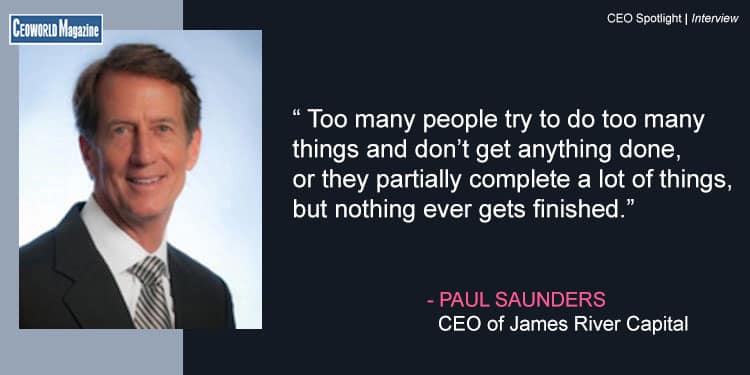CEO Spotlight: James River Capital CEO, Paul Saunders

We recently spoke with Paul Saunders about his experiences at the helm of James River Capital, their wins and challenges. Tell me about yourself and James River Capital’s vision in a few sentences?
I am Paul Saunders, the CEO of a diversified financial services business called James River Capital. We perform third-party marketing for alternative investment products. We also run a program of broadly-diversified hedge funds, we manage a long-only stock portfolio broken into small-cap, mid-cap, and large-cap stocks, and we manage a few other, smaller programs in other asset classes. I spend the bulk of my time overseeing the main trading programs. I have been running fund of funds programs since 1980, I have two senior analysts and one IT person that help me manage our program, and each of my senior analysts have been in the business for over twenty years.
Regarding the fund of funds program, we try to run a diversified portfolio at James River Capital but also try to be opportunistic when possible. For example, after the market collapsed in 2008, we got very aggressive investing in distressed funds and other credit funds. We had some managers that were up more than 100% following the 2008 sell off and we rode this credit wave for a few years until we eventually reduced that position to virtually zero for the next several years. We have been building back our credit position over the past year as the stock market has become fully valued in our opinion.
Having been in the business for more than forty years, we have a good reputation and network for sourcing hedge fund managers. We are generally able to access new managers with limited capacity, even though we are still relatively small compared to other institutional investors. We are willing to invest in lesser-known managers, some of whom have done extremely well for our portfolio. Given that I have spent forty years interviewing hundreds of managers per year, I believe our team has developed good instincts when selecting managers for our portfolio. We have invested early with mangers and we have exited at the top with several managers as they grew ready to move on.
This business is not an exact science and cannot be done well by simply analyzing past performance. There are many variables that go into a decision to hire or fire a manager. We have definitely made some mistakes at James River Capital but fortunately, our successes have far outweighed our mistakes. One of the statistics that I am proud of is that our slugging ratio has been very strong. The slugging ratio measures the size of your wins verses the size of your losses. In other words, we have generally invested much more with our most successful managers and have invested very little with our least successful managers. Of course, that is not always the case but, on average, the numbers are very good.
We also run a long stock program. James River Capital’s mission here is to come up with an investment strategy that can beat the stock indexes themselves. Our goal is for our Large-Cap fund to beat the S&P 500 Total Return Index and for our Mid-Cap fund to beat the S&P 400 Mid-Cap Total Return Index and the Small-Cap fund to beat the S&P 600 Small-Cap Total Return Index. As hard as it is to believe, only about 10% of long-only managers actually beat the index. One would think that if you can cherry pick the best stocks out of the S&P 500 that you could outperform the average performance of all of the stocks. It would be like picking the twenty best golfers on the PGA tour and betting that they would beat the average score of all of the golfers. Seems simple, but it is rarely achieved, at least with stocks. We are more value-oriented and less focused on momentum, which has been a tough space over the past several years. The FAANG stocks (Facebook, Amazon, Apple, Netflix, Google) and MAGA stocks (Microsoft, Amazon, Google, Apple) have dominated the indexes, in that the indexes are market cap weighted, and those tech stocks, which have huge market caps, have performed incredibly well and have been tough to beat.
Given that we are more value-oriented and look for consistent revenues and earnings, we are not likely to own many of these tech stocks in our portfolio. We look for stocks that have consistent revenues and earnings over a ten-year period and then hope that they continue that same behavior going forward. We screen thousands of stocks systematically, those that qualify are ranked and we will purchase the top twenty-five names that are cheap enough to buy. We measure cheapness in terms of price to earnings (PE) and price to earnings divided by growth (PEG). We keep a stock in our portfolio until we see a deterioration in earnings at which time we will sell and replace it with another stock that meets our criteria. We have been running this program for three years and so far, the results have been mixed; it is not easy to beat the indexes in any given year. We are still learning, and we continue to believe that buying good companies at attractive prices will work best in the long run. We will miss the biotech homeruns and the high-flying momentum-driven tech companies that have revenues but no earnings, but hopefully over a long time period we will compound at a higher rate than the indexes. Time will tell.
What gave you the idea for what you/your company does? How did it start?
From 1983 to 1995 I ran the alternatives and managed-futures business for Kidder Peabody in New York. In that role, I structured single-manager and multi-manager products to be sold through Kidder Peabody’s worldwide sales network. In 1995, PaineWebber purchased Kidder Peabody and I left and started James River Capital Corp. We somehow got very lucky and were able to keep everyone on my team and retain all of our clients. We also maintained a relationship with PaineWebber and continued to provide them with hedge fund products to distribute through their global salesforce, albeit as an independent firm as opposed to as part of the PaineWebber group. Our business grew dramatically, and we diversified our product mix from single-manger and multi-manger products to a managed global macro and equities product. A few years later, we started a fund administration company called Admiral Administration, which was subsequently purchased in 2012.
What’s your favorite thing about your chosen profession?
My favorite thing about what I do is my ability to meet with and learn from, some of the smartest financial minds in the world. Successful hedge fund managers can earn huge profits and that possibility attracts some of the best and brightest people in the world to our industry. As a buyer of these products, I get to spend hours with almost anyone in the financial industry I choose. That is an incredible privilege and opportunity. I have probably interviewed around 200 managers per year for the last forty years. To be able to ask the smartest people in the industry how they make money, screen stocks, diversify and size their positions, take profits or take losses, and how they scale into or out of positions is quite a free education and an unbelievable opportunity. I feel so lucky to do what I love every day. Additionally, I enjoy the challenge of the ever-changing global markets and having to be creative about capitalizing on risks or opportunities that I see in the dynamic world economy.
What keys to being productive can you share with us?
One of the keys to being productive is staying busy. If you are busy you simply have to be productive, and to be productive you have to be focused. Too many people try to do too many things and don’t get anything done, or they partially complete a lot of things, but nothing ever gets finished. It is a challenge to stay focused while running a company. Many people need my time and input, which can make it hard for me to give my full effort to my most important tasks.
Tell us one long-term goal in your career.
A long-term goal of mine has always been to be financially successful. That goal is why I chose my current profession. As a money manager I get paid on assets under management; those assets can either grow organically, by attracting new business, or by increased investments from existing clients. There is no real limit on what a successful money manager can make. All of this depends on performing well, which is why I have always worked hard to perform as best as I possibly can. I like the fact that I only do well if my clients do well and my goal is to continue doing that.
Have you read?
Antigua and Barbuda Citizenship by Investment Program (CIP), St. Lucia CIP: Saint Lucia Citizenship By Investment Program, Vanuatu CIP: Vanuatu Citizenship By Investment Program, Montenegro Citizenship By Investment Program (CIP), Moldova CIP: Moldova Citizenship By Investment Program, Turkey CIP: Turkey Citizenship By Investment Program, Portugal Golden Visa Program, Dominica Citizenship by Investment Programme
Add CEOWORLD magazine to your Google News feed.
Follow CEOWORLD magazine headlines on: Google News, LinkedIn, Twitter, and Facebook.
Copyright 2024 The CEOWORLD magazine. All rights reserved. This material (and any extract from it) must not be copied, redistributed or placed on any website, without CEOWORLD magazine' prior written consent. For media queries, please contact: info@ceoworld.biz








